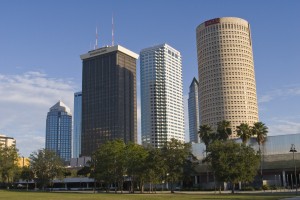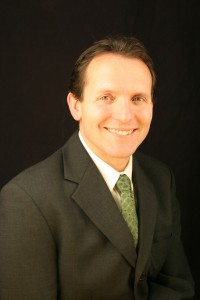Before we get too excited about Tropical Depression 9, which has formed in the Atlantic Ocean, we checked in USF Professor Jennifer Collins, who is one of the nation’s leading hurricane experts and leads USF’s Weather Center. It seems with 50,000 guests headed our way for the Republican National Convention, the weather is making some people nervous.
Collins, though, says remain calm. She writes:
August to October is the climatological peak season for hurricanes in the North Atlantic so it is not unusual for us to be expecting more storms right now. Many people may have seen some pictures of models directing what may be called Hurricane Isaac later today towards us. This MAY become a reality and I recommend that everyone check their hurricane kits and prepare accordingly. We do have at least three things on our side. 1) Predicting so far in advance (about a week away) does not yield the most accurate forecasts; 2) There are many different models out there and some of them do track the system away from us, some of them keeping it over the ocean; and 3) There is a chance for significant land interactions (if it passes over Hispaniola or Cuba the storm could significantly weaken in intensity).
 Oh Salon.com, you’ve gone and got Tampa people fired up by calling our city America’s “Hottest Mess.” The weekend feature by columnist Will Doig put an uncomfortable (and many will argue not completely accurate) spotlight on Tampa – think an urban development version of the 360-degree mirror from “What Not to Wear”. Yikes, do we really look like that?
Oh Salon.com, you’ve gone and got Tampa people fired up by calling our city America’s “Hottest Mess.” The weekend feature by columnist Will Doig put an uncomfortable (and many will argue not completely accurate) spotlight on Tampa – think an urban development version of the 360-degree mirror from “What Not to Wear”. Yikes, do we really look like that?
Doig’s piece was thankfully complimentary to the University of South Florida, noting both the excellent effort from Architecture’s Shannon Bassett’s (re)Stitch Tampa Bay and USF Health’s Center for Advanced Medical Learning and Simulation downtown as glimmers of hope. On Point asked two other faculty experts to weigh in further, community development expert Elizabeth Strom and Center for Urban Transportation Director Jason Bittner. They post below:
Strom Writes:
Will Doig notes many problems of urban development and planning all too familiar to those of us who live here. The fabric of our historic built environment was nearly destroyed by urban renewal and highway construction in the 1950s and 1960s. Since then, most new development has occurred outside the urban core, so our communities are a collection of far-flung subdivisions linked by (often congested) roadways. Our mass transit system is inadequate to serve our sprawling region, with no rail lines and few express bus lines.
I agree with much of his criticism (and most notably with the thoughtful observations of School of Architecture and Community Design professor Shannon Bassett), so why do I find the tone of his article to be so irritating? First, the academic in me recoils at the ahistorical quality of his analysis. Blaming the Tampa Bay area’s sprawl and lack of a center on “Tea Party politics,” as he does, might generate more hits on Salon, but it overlooks the generations of planning decisions that created our current built environment, and gives the false impression that we could eliminate sprawl and autodependence tomorrow if only we’d jettison those Tea Party thinkers. One could certainly argue that Tea Party activists helped defeat the referendum that would have supported the development of light rail in 2010, but in fact there have been plans on the boards to create a light rail system since the 1970s, none of which have been realized.
Secondly, the idea that Tampa is uniquely beset by these problems is simply not true. While we are one of the last big cities to lack any sort of light rail system, one would be hard pressed to argue that development patterns in other Sunbelt cities are less “sprawling” than ours.
It would be wonderful if that helps kick start a discussion about what makes great urban spaces and how we can get there. But Doig’s suggestion that Tampa and its built environment are simply an extension of reactionary Tea Party approaches to planning is belittling to the many people working to undo planning mistakes made, here and elsewhere, over many decades, and it’s simply untrue.
Bittner’s take:
Tampa certainly faces its share of transportation challenges. The inability to modernize and transform its public transportation system to fixed guideways or rail, coupled with 30 years of amoebic suburban growth joined by recent economic recession, results in the suboptimal network that will be on display during the RNC. There is a lot more in play however than blaming the loss of a high speed rail line, tea party politics, or development guidelines. Doig’s focus on the urban issues also misses many of the emerging positive aspects of the total transportation picture in Tampa.
Tampa has a world class airport, with a plan for an integrated multimodal transportation hub in its future. The Port of Tampa is one of the most efficient processors of bulk commodities in the nation and provides efficient movements of goods to our community. HART, underfunded as it is, is adding a newly branded MetroRapid line to connect the USF community with the downtown. New capacity for freight and commuters along clogged interstates and arterials improve efficiency. New public investments in the urban core, includig the Riverwalk and the museums, are making the area more attractive to pedestrians. New bike lanes and the nearly completed I-4 connector will improve livability in downtown and tourist areas. Bassett’s assessment is dead on that the system is not integrated but system-wide changes do not happen overnight. Pace is glacial but failing to recognize Tampa’s recent progress with a more reasonable spin is decidedly unfair.
Perhaps the biggest issue for communities like Tampa is simply one of governance. Doig points to it, but dismisses the argument. The City of Tampa and the City of Temple Terrace easily approved new investments in public transportation infrastructure. Analysis of the voting patterns show that Tampa prefers improved accessibility – it was the outlying metro areas that sunk the ballot measures that could have injected a much needed stimulus into the system. The state’s constitution doesn’t allow cities to raise revenue themselves for transportation.
Unfortunately, the RNC will have the biggest impact on the city neighborhoods that already are clamoring for transportation investment – the same areas that are willing to tax themselves to provide such improvements. The road closures, congestion, and limited accessibility will foretell what continued economic growth and population increases will bring to the area. Possibly, the rest of the county will take note – more probably, they will not.
If nothing else, the attention that Tampa will receive next week will at least elevate the public dialogue on these and many other issues. What we ultimately decide to do to ready ourselves for the Tampa of the future will be decided long after the tents are packed up, the buses returned to their charters and the speeches completed. Tampa is a work in progress but one that is not a “mess.”
“If they can’t win Florida, they can’t win the White House back. It’s plain and simple. Even the Democrats will be tuned in to see how things are playing here.” – Susan MacManus.
Mitch Stacy of the Associated Press takes a look at why the I-4 Corridor matters when it comes to Presidential politics: http://www.cbsnews.com/8301-505245_162-57493955/gop-convention-shines-spotlight-on-fla/
“If the Republicans lose they’re probably going to point to this decision.” – USF Distinguished Professor of Political Science Susan MacManus
They don’t call it the “Third Rail of Politics” for nothing. USF’s Susan MacManus explains to Reuters why Mitt Romney’s pick of Paul Ryan as his running mate means trouble in Florida in this story. She also talks to WTSP news here in Tampa on the pick. Watch here.
Photo credit: AP.
 Steve Inskeep from NPR’s Morning Edition has a wonderfully-reported story on race, economics and politics in Hillsborough County. Steve spent some time touring the area with USF Political Science Professor Susan MacManus. Worth the time to take a listen: http://www.npr.org/2012/08/07/158111211/race-an-issue-that-simmers-in-florida-battleground
Steve Inskeep from NPR’s Morning Edition has a wonderfully-reported story on race, economics and politics in Hillsborough County. Steve spent some time touring the area with USF Political Science Professor Susan MacManus. Worth the time to take a listen: http://www.npr.org/2012/08/07/158111211/race-an-issue-that-simmers-in-florida-battleground
 If you’ve been transfixed by Olympic gymnast Gabby Douglas – and who doesn’t love that megawatt smile! – over the last couple of weeks, USF’s Bill Sutton, director of the new College of Business’ Sport and Entertainment Management program, says get ready for more Gabby after the games. Check out this story from Reuters in The Financial Post:
If you’ve been transfixed by Olympic gymnast Gabby Douglas – and who doesn’t love that megawatt smile! – over the last couple of weeks, USF’s Bill Sutton, director of the new College of Business’ Sport and Entertainment Management program, says get ready for more Gabby after the games. Check out this story from Reuters in The Financial Post:
“We’re fickle, but right now she is absolutely the story,” Sutton, a former-vice president of marketing for the National Basketball Association and head of the sports and entertainment management program at the University of South Florida, told Reuters.
“Her athletic ability, her age, the event gymnastics, the number of people who watch gymnastics, the high women’s audience, the fact she is a role model for young women… She’s awesome, it’s perfect.”
Read the entire story here.
Photo credit: AP.
 Governing magazine takes an interesting look at a well-worn path to the Presidency by governors and how voters view their ambitions in this era of economic uncertainty. USF’s Distinguished Professor of Political Science Susan MacManus lends her insight:
Governing magazine takes an interesting look at a well-worn path to the Presidency by governors and how voters view their ambitions in this era of economic uncertainty. USF’s Distinguished Professor of Political Science Susan MacManus lends her insight:
“Voters now expect their governors to put all their efforts into being governor and focusing on stimulating economic recovery, rather than seeking a place on the national political stage,” MacManus said.
Read the complete article here.
 The economic effects of the expiring federal fiscal policies which raise taxes and cut spending, scheduled to take effect in January 2013 and popularly known as “fiscal cliff,” could be deepened by global uncertainty and the Eurozone crisis if Congress does not act and the current economic landscape does not improve. This could come about as a result of potential further downgrade of U.S. debt, US. Banks’ financial exposure, U.S. trade imbalances with the European Union (EU), as well as low consumer and business spending in the Eurozone.
The economic effects of the expiring federal fiscal policies which raise taxes and cut spending, scheduled to take effect in January 2013 and popularly known as “fiscal cliff,” could be deepened by global uncertainty and the Eurozone crisis if Congress does not act and the current economic landscape does not improve. This could come about as a result of potential further downgrade of U.S. debt, US. Banks’ financial exposure, U.S. trade imbalances with the European Union (EU), as well as low consumer and business spending in the Eurozone.
In its report that covered the economic effect of the coming fiscal cliff on the U.S. economy in 2013, the U.S. Congressional Budget Office (CBO) estimates that the fiscal cliff will reduce the deficit in 2012 and 2013 by $607 billion (or about 4% of GDP) but will have a drag on the economy. Adjusting for the effects of lower consumer and business spending, higher unemployment and guarded business sentiment, the CBO projects the deficit will reduce to $560 billion but the economy will contract by 1.3% in the first half of 2013 followed by a normal growth of 2.3% in the second half. However, given the current global economic landscape and the possibility of the U.S. debt being downgraded if Congress is unable to reach further agreement on the U.S. debt ceiling, the resulting economic uncertainty can complicate any economic downturn from the fiscal cliff, resulting deeper than aniticpated downturn if the global economy and the crisis in the euro-zone does not improve.
The U.S. unemployment rate has been above 8 percent for more than three years and according to the Bureau of Economic Statistics, the U.S. GDP growth in the first quarter of 2012 was just 1.9 percent. In its latest World Economic Outlook, the International Monetary Fund (IMF) revised its baseline forecast and projected that the global economy will grow 3.5 percent in 2012, down 0.1 percentage points from the April forecast, and 3.9 percent in 2013, 0.2 percentage points lower than the baseline. According to the IMF, growth has slowed in the major emerging economies like Brazil, India and China due to the weak external environment and sharp contraction in domestic demand in response to capacity constraints and policy tightening. The IMF said the relatively minor setback in the projected global growth is based on the assumption that U.S. fiscal policy will not tighten sharply in 2013; that there will be enough policy action to ease financial condition in the Eurozone periphery – Ireland, Portugal, Spain and Greece -; and that efforts by major emerging markets to stimulate growth will gain traction. This implies if these assumptions do not hold, the world will see slower economic growth than projected.
 USF Center for Urban Transportation Director Jason Bittner was following television business network CNBC’s release of its ranking of the top places to do business this week. Florida’s ranking dropped, but Bittner writes that those who do the rankings might also be missing much of what’s important in what makes Florida a very good place to do business. He shares his thoughts below:
USF Center for Urban Transportation Director Jason Bittner was following television business network CNBC’s release of its ranking of the top places to do business this week. Florida’s ranking dropped, but Bittner writes that those who do the rankings might also be missing much of what’s important in what makes Florida a very good place to do business. He shares his thoughts below:
Florida recently was rated in the bottom half of states to do business in by CNBC’s Top States for Business. Florida dropped from 18th last year to 29th this year. 29th! For the nation’s fourth largest state, 29 is an embarrassment! While as a researcher I understand the significant gamesmanship that goes into these rankings and the assumptions and weights that grossly affect particular comparisons, it nonetheless is damaging to the overall health of our economy and the attitudes our residents adopt. Perception is reality and like it or not a limited number of “tastemakers” exist that define the message for how we’re evaluated. If we let it, CNBC will be a tastemaker. Their rankings look at the usual factors: cost of living, economy, cost of doing business, etc. Toby Lavine of The Remarkable Project observed that what the rankings do not measure, really, is perception. How is the ‘brand’ of Florida seen by people in and out of the state?
When I first moved into Tampa from Wisconsin earlier this year, a lot of outside people predefined the brand of Florida for me. It was cast in terms of our aging population, lower education standards, or hot and muggy weather. Among my favorites: “Old people don’t live in the Bay Area, old people live all over Florida and their parents live in the Bay Area” and “Florida is probably the only state in the nation that gets more South the more north you go.” One of the other things that I heard is that technology businesses tend to shy away from Florida because we don’t have a young, tech-savvy workforce. These perceptions unfortunately get reflected in these types of ranking systems. That perception is wrong and it is time to start telling the story and defining our brand.
USF Sociology Chair Robert Benford had a thought-provoking comment in Insider Higher Ed’s coverage of the Penn State Scandal. The story looked specifically at why so many powerful people would lose their sense of perspective in the face of serious allegations. Benford said:
“They know that these folks have enormous power, and they can rally the power elite in that community or that state to send them packing,” said Robert Benford, chair of the sociology department at the University of South Florida. “At the end of the day, athletics and academics are oil and water. They just don’t go together. And we are constantly running into these kinds of issues. Few people have, I think, the courage or the power to try to take it on.”
Inside Higher Ed


